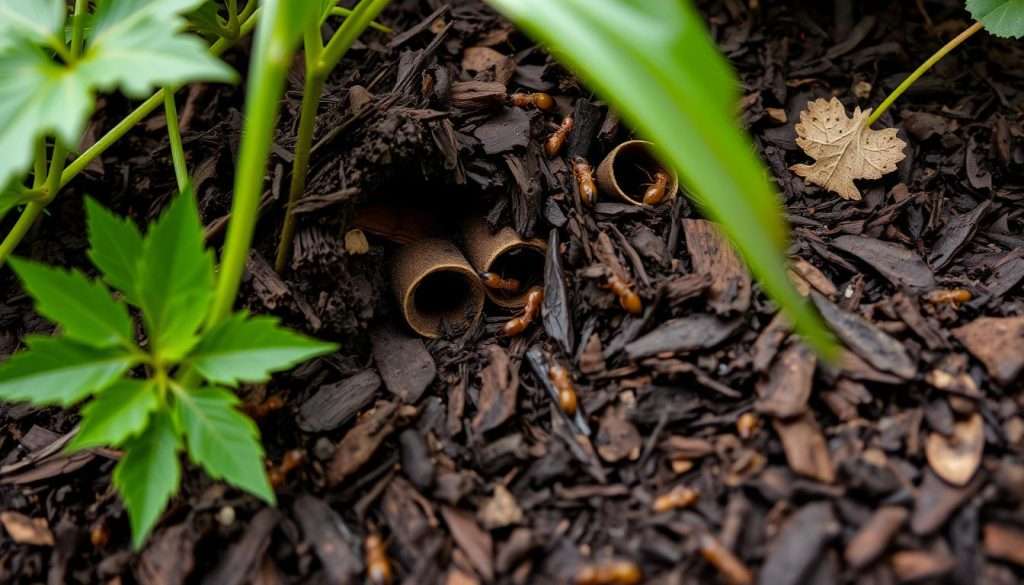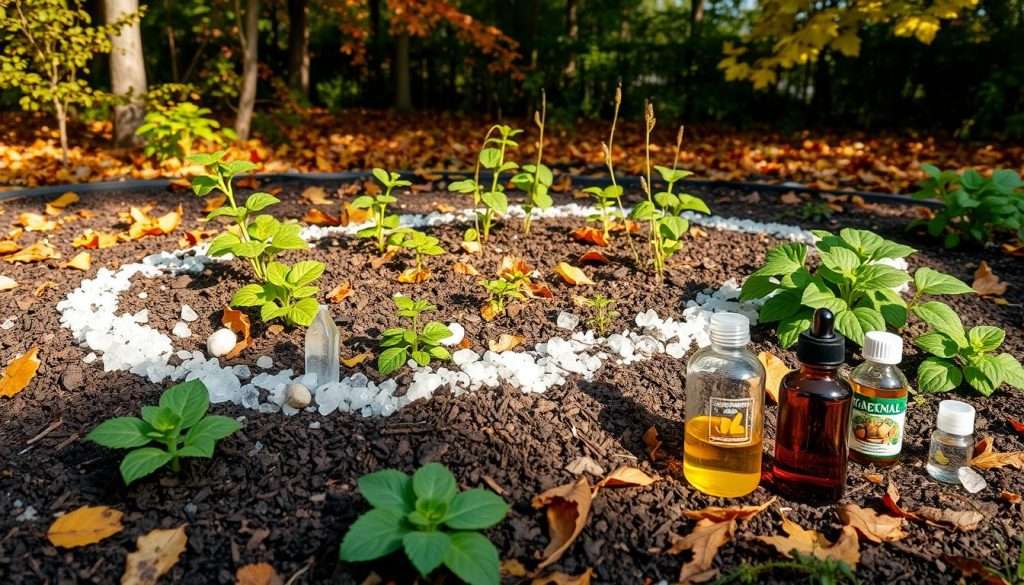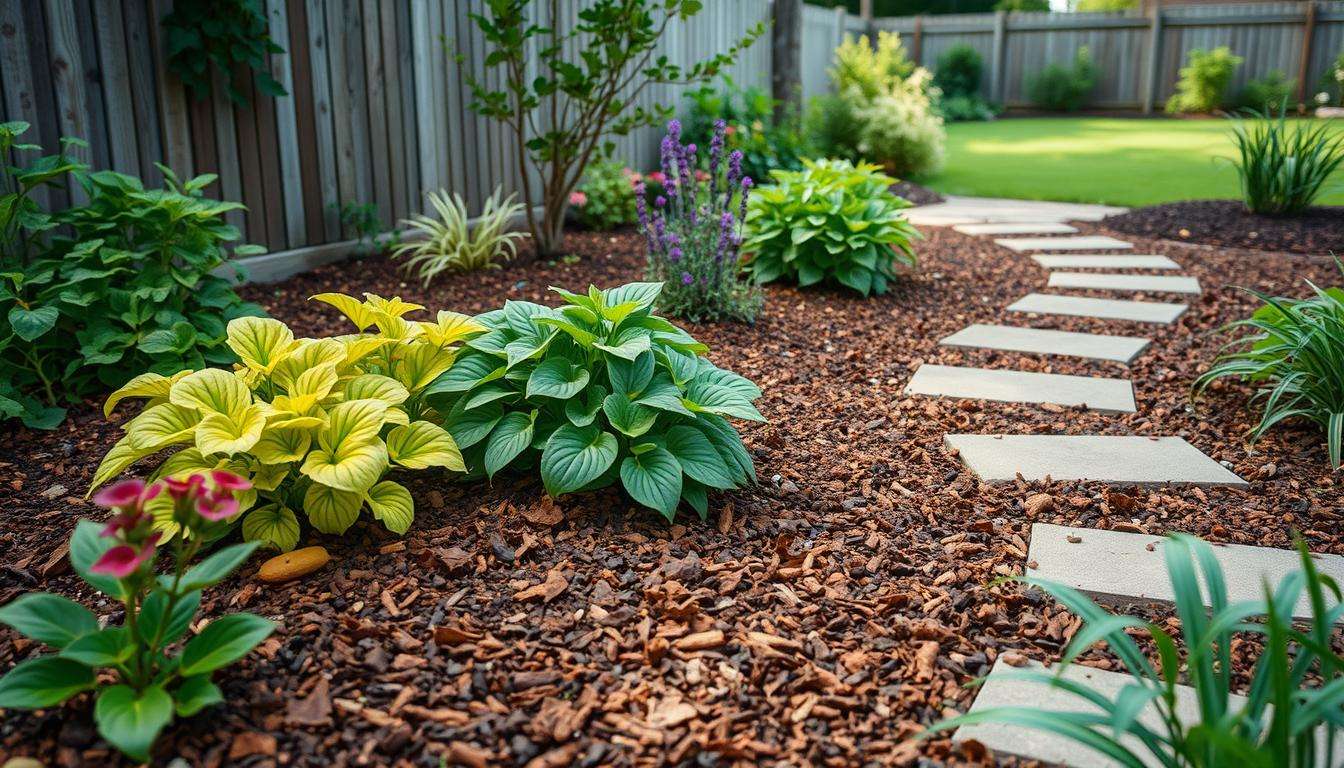Understanding the link between mulch and termites is key for homeowners. You might wonder, does mulch attract termites? The truth is more complex. Mulch doesn’t directly attract termites. Instead, it can make an environment where termites thrive. This guide will help you prevent termites while still enjoying your garden’s mulch.
Many worries about mulch and termites come from myths. With the right care and knowledge, you can protect your home from termites. And keep your garden healthy too.
Key Takeaways
- Mulch doesn’t attract termites directly but can create a suitable habitat for them.
- Moist environments under mulch increase the risk of termite activity.
- Using mulch types like cedar and cypress can help resist termite infestations.
- Keeping mulch at least 12 inches away from your home’s foundation is crucial.
- Thick layers of mulch (>4-6 inches) can foster conditions favorable for termites.
- Regularly replacing old mulch can minimize the buildup of decaying organic matter.
- Incorporating inorganic mulches like gravel can reduce termite attraction.
Understanding Termite Behavior and Habitat
Termites are fascinating yet destructive creatures. They have specific behaviors that help them thrive in different places. Knowing the types of termites is key for homeowners to protect their homes. This knowledge helps in preventing infestations.
Common Types of Termites in the U.S.
The U.S. has many types of termites, each with its own habits and homes. Subterranean termites are the most destructive. They live underground in huge colonies. They love areas with lots of moisture and termites because they build mud tubes to get to food.
Drywood termites live in dry wood and leave small pellets as signs of their presence. Dampwood termites like decayed wood in wet places. Knowing these types helps prevent damage.
Why Termites Prefer Moist Environments
Moisture is key for termite behavior. Termites need moisture to live and get it from the wood they eat. Leaky pipes or bad drainage systems attract them to homes. Standing water near foundations increases the risk of infestations, especially for subterranean termites.
Watching for these conditions can help stop infestations before they start.
For more detailed insights on termite behavior and prevention strategies, check out this guide.
Does Mulch Attract Termites?
It’s important to know if mulch attracts termites for homeowners worried about mulch termite infestation. Mulch and termites have a complex relationship. We’ll look into this and clear up some myths.
The Relationship Between Mulch and Termite Activity
Mulch doesn’t attract termites on its own. Termites like moist places, like under mulch. But, they only go to mulch if they’re already nearby. Here are some key points:
- A thick layer of mulch, especially over three inches, can be humid and attract termites.
- Some mulches, like cypress and pine bark, are more appealing because they’re made of organic wood.
- Cedar and melaleuca mulches can help keep termites away, making them safer for gardens.
Common Myths About Mulch and Termites
Many people think mulch makes areas more termite-prone. But, studies show termites don’t just live on mulch. They prefer higher quality wood, like construction debris or buried rubble.
To keep termites away from mulched areas, regular maintenance is key. Simple steps include:
- Removing debris from mulch beds.
- Ensuring proper drainage to avoid too much moisture.
- Creating a mulch-free zone at least one foot wide next to buildings.
By following these tips, you can lower the risk of mulch and termites problems on your property.
| Type of Mulch | Attraction Level to Termites |
|---|---|
| Cypress Mulch | High |
| Pine Bark Mulch | High |
| Cedar Mulch | Low |
| Melaleuca Mulch | Low |
| Eucalyptus Mulch | Moderate |
Factors That Influence Termite Activity in Mulch
Many things affect how active termites are in mulch. Knowing these can help you choose the right mulch for your home. Moisture and the type of mulch are key. Managing these can lower the chance of termites.
Moisture Levels Underneath Mulch
Too much moisture under mulch is perfect for termites. They love wet places. So, it’s important not to overwater plants near the mulch.
Good drainage is key to keep termites away. Check the mulch often to catch termites early. This way, you can fix problems fast.
Types of Mulch and Their Nutritional Value
Each mulch type has its own nutritional value. Wood mulches like pine and cypress can attract termites as they decay. Organic mulches, like wood chips, are also attractive to termites.
Inorganic mulches, like recycled materials or pebbles, don’t feed termites. Experts suggest using mulches like cedar or eucalyptus to keep termites away.
Mulch as Termite Habitat
It’s important for homeowners to know how mulch can attract termites. Mulch acts as a shield, protecting termites from predators and bad weather. It also keeps them moist, helping them live well if they can.
How Mulch Provides Shelter for Termites
Mulch makes a cozy spot for termites when used too much. They hide under it, safe from harm and dry air. This makes mulch a great place for termites to live, especially because it keeps moisture in.
Conditions That Encourage Termite Infestation
Using too much mulch can attract termites. More than 4-6 inches can hide signs of termites and keep soil wet. Keeping mulch thin, about 1 inch, helps plants and keeps termites away.
Also, keeping mulch 6-12 inches from your house stops termites from getting in. Regular care, like not overwatering, helps keep termites away too.

For more tips on using mulch and stopping termites, check out this resource. It has lots of useful advice.
| Type of Mulch | Effect on Termites | Recommendation |
|---|---|---|
| Cedar | Generally repels termites; less appealing for feeding | Good option for gardens |
| Cypress Heartwood | Effective natural repellent | Highly recommended for termite control |
| Melaleuca | May repel termites due to natural oils | Consider for gardens |
| Redwood | Less attractive but may decay faster | Monitor for durability |
| Inorganic Mulch | Minimal attraction for termites | Excellent long-term choice |
Identifying Termite Risks with Mulch
Knowing the risks of mulch is key for homeowners. Watching your landscape closely can help find termites early. The moisture and type of mulch are big factors in termite risks.
Signs of Termite Activity Around Mulch
Spotting termite signs early is crucial. Look out for:
- Mud tubes on walls, termites’ travel paths.
- Discarded insect wings near mulch, a sign of swarming.
- Flying insects around mulch, often near colonies.
Seeing these signs means you need to act fast. Keep a gap of two to four inches between mulch and your home to stop termites.
Impact of Heavy Mulching on Termite Presence
Heavy mulching can attract termites. A thick layer of mulch, over three inches, is moist and hides termite signs. Without managing moisture, mulched areas can become termite homes.
Keeping mulch dry and aerated can keep termites away. Make sure mulch is six inches from brickwork or walls. This makes it harder for termites to live there.
Protecting Mulch from Termites
Protecting mulch from termites is key. You want your garden to stay safe and pretty. Follow some simple steps to keep pests away.
Best Practices for Mulching Safely
To keep termites away from your mulch, follow these tips:
- Don’t make mulch too thick, 2-3 inches is best. Too much can attract termites.
- Change old mulch often. This cuts down on bugs living in it.
- Check if the mulch is too wet. Good drainage stops moisture buildup.
- Keep mulch 6 inches from wood. This stops termites from reaching your house.
- Use cedar or cypress mulch. They resist pests and are safer near your home.
Importance of Distance from Foundations
It’s important to keep mulch away from your home. Here’s how:
- Keep mulch 12-18 inches from your home. This lowers the risk of termites.
- Make a dry area around your home. This keeps bugs away.
- Watch for moisture problems. Dry areas stop termites from coming.

Termite-Resistant Mulches: Options for Gardeners
Choosing the right mulch is key in gardening. It helps keep termites away. There are mulches that naturally keep termites off. Knowing about these can help you pick the best for your garden.
Characteristics of Termite-Resistant Mulches
Some mulches, like cypress mulch, rubber mulch, and gravel, are less appealing to termites. They have less cellulose or other features that termites don’t like. These choices can lower the risk of termites compared to organic mulches.
- Cypress heartwood: Contains natural oils that deter termites.
- Rubber mulch: Made from old tires, offering durability and resistance.
- Stone or gravel: Inorganic options that provide no food source for termites.
Comparing Organic and Inorganic Mulching Materials
Organic and inorganic mulches have different effects on termites. Organic mulches, like wood chips, can attract termites as they break down. Inorganic mulches, on the other hand, have big advantages.
| Type of Mulch | Attractiveness to Termites | Benefits |
|---|---|---|
| Organic (e.g., wood chips) | High | Enhances soil nutrients; improves moisture retention |
| Inorganic (e.g., gravel) | Low | No food source; long-lasting |
By picking termite-resistant mulches, you can have a beautiful garden. You also reduce pest worries. Checking your mulch often helps keep your garden healthy and termite-free.
Conclusion
Knowing how mulch and termites relate is key for homeowners. Mulch doesn’t attract termites directly. But, it can make your garden more inviting to them.
Choosing the right mulch, like melaleuca or cypress heartwood, helps a lot. These types are less likely to attract termites. Keeping your mulch away from your home’s base is also important.
Regularly check your mulch and replace it when needed. Using natural repellents like cedar or orange oil can help too. These steps keep your garden safe from termites.
Whether you get help from professionals or do it yourself, knowing what termites need is crucial. With the right approach, you can enjoy your garden without worrying about termites.
